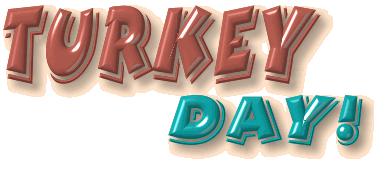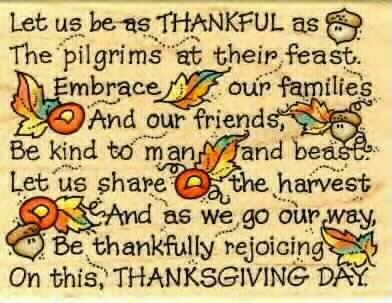Music For Thanksgiving
Page Created: 11/26/2000 Page Last Updated: 11/21/2025 14:00
Remember:
The National Thanksgiving Proclamations
 The first official Thanksgiving Proclamation made by the American colonies who rebelled against the Crown of England was issued by the Continental Congress in 1777. Six national Proclamations of Thanksgiving were issued in the first thirty years after the founding of the United States of America as an independent federation of States. President George Washington issued two, President John Adams issued two, President Thomas Jefferson made none and President James Madison issued two. In 1789 Washington designated a national thanksgiving holiday for the newly ratified Constitution, specifically so that that the people may thank God for "affording them an opportunity peaceably to establish a form of government for their safety and happiness" and for having "been enabled to establish constitutions of government for our safety and happiness, and particularly the national One now lately instituted, for the civil and religious liberty with which we are blessed..."
The first official Thanksgiving Proclamation made by the American colonies who rebelled against the Crown of England was issued by the Continental Congress in 1777. Six national Proclamations of Thanksgiving were issued in the first thirty years after the founding of the United States of America as an independent federation of States. President George Washington issued two, President John Adams issued two, President Thomas Jefferson made none and President James Madison issued two. In 1789 Washington designated a national thanksgiving holiday for the newly ratified Constitution, specifically so that that the people may thank God for "affording them an opportunity peaceably to establish a form of government for their safety and happiness" and for having "been enabled to establish constitutions of government for our safety and happiness, and particularly the national One now lately instituted, for the civil and religious liberty with which we are blessed..."
 After 1815 there were no more Thanksgiving Proclamations until the Presidency of Lincoln, who made two during the Civil War.
After 1815 there were no more Thanksgiving Proclamations until the Presidency of Lincoln, who made two during the Civil War.
He declared Thanksgiving a Federal holiday as a "prayerful day of Thanksgiving" on the last Thursday in November.
Since then every U.S. President has always made an official Thanksgiving Proclamation on behalf of the nation. President Franklin D. Roosevelt set the date for Thanksgiving to the fourth Thursday of November in 1939 (approved by Congress in 1941).
Music To Listen To
- Amazing Grace - "Amazing Grace" is a well-known Christian hymn. The words were written late in 1772 by Englishman John Newton. They first appeared in print in Newton's Olney Hymns (1779), which he worked on with William Cowper.
- Amazing Grace Johnny Cash
- A Mighty Fortress - The best known of Martin Luther's hymns. Luther wrote the words and composed the melody sometime between 1527-1529. It has been translated into English at least seventy times and also into many other languages. The words are a paraphrase of Psalm 46. The most popular English version, "A mighty fortress is our God, a bulwark never failing," was translated by Frederick H. Hedge in 1853.
- American Patrol
- Autumn Leaves - A much-recorded popular song. Originally a 1945 French song "Les feuilles mortes" (literally "Dead Leaves") with music by Joseph Kosma and lyrics by poet Jacques Prévert, English lyrics were written in 1949 by the American songwriter Johnny Mercer. It has become a pop standard and a jazz standard in both languages, and as an instrumental.
- Autum Time - Comes Autumn Time is a concert overture by Leo Sowerby. Composed in 1916, it was introduced by the New York Symphony Society, under the baton of Walter Damrosch, in 1918. The piece is one of Sowerby's most popular, and was inspired by a poem by Bliss Carman entitled "Autumn".
- Blue Danube
- Circle Of Life
- Colors Of The Wind - "Colors of the Wind" by composer Alan Menken and lyricist Stephen Schwartz was the 1995 Oscar-winner for Best Original Song from the Disney animated feature film Pocahontas. It also won the Golden Globe in the same category as well as the Grammy Award for Best Song Written for a Movie. The song poetically presents the Native American viewpoint that the earth is a living entity where mankind is connected to everything in nature.
- Come Ye Thankful - The modern British tradition of celebrating Harvest Festival in churches began in 1843, when the Reverend Robert Hawker invited parishioners to a special thanksgiving service at his church at Morwenstow in Cornwall. Victorian hymns such as "We plough the fields and scatter", "Come ye thankful people, come" and "All things bright and beautiful" helped popularize his idea of harvest festival and spread the annual custom of decorating churches with home-grown produce for the Harvest Festival service.
- Comfort
- Dont Worry Be Happy
- Faith Of Our Fathers
- For The Love Of God - "For The Love Of God" is an instrumental guitar piece by Steve Vai. Released as the flagship seventh song on Vai's 1990 album Passion and Warfare, it is often cited as Vai's greatest composition and was voted #29 in a readers' poll of the 100 greatest guitar solos of all time for the magazine Guitar World. The piece, which runs for six minutes, features a number of techniques, including legato, whammy bar tricks, harmonics and volume swells.
- Faith Of Our Fathers - "Faith of Our Fathers," recorded June 8, 1942 with John Scott Trotter and His Orchestra and Max Terr's Mixed Chorus. It is a Christian Hymn.
- Give Thanks
- God Bless The USA
- Greensleeves
- It Had To Be You
- Let There Be Peace On Earth
- Memories Are Made Of This
- Mighty Fortress
- My Sweet Lord
- Old Dogs Children and Watermelon Wine
- Old Home Place - Folk song of recent vintage.
- Over The River And Through The Woods - "Over the River and Through the Woods" is a song written by Lydia Maria Child in 1844. It celebrates her childhood memories of visiting her Grandfather's House. It is sometimes alternated with lines about Christmas, rather than Thanksgiving.
- Over The River And Through The Woods 2
- Praise The Lord And Pass The Ammunition
- Sentimental Journey
- Shendoah - With possible origins in Virginia, noting that its title is also the name of a Virginia river, the song has been considered for that state's official state song. In his 1931 book on sea and river chanteys entitled Capstan Bars, David Bone wrote that "Oh Shenandoah" originated as a river chantey (the word is also spelled shanty) and then became popular with sea-going crews in the early 1800s. The Missouri Congressman Ike Skelton noted in 2005 that Missouri artist George Caleb Bingham immortalized the jolly flatboatmen who plied the Missouri River in the early 1800s; these same flatboatmen were known for their chanties, including the haunting "Oh Shenandoah". This boatmen’s song found its way down the Missouri and Mississippi Rivers to the American clipper ships, and thus around the world. The lyrics tell the story of a roving trader in love with the daughter of an Indian chief; the rover tells the chief of his intent to take the girl with him far to the west, across the Missouri River.
- Shenandoah Mormon Tabernacle Choir
- Swinging On A Star
- Thank You - "Thank You for the Music" was the twenty-fifth and final UK single for Swedish pop group ABBA, released in November 1983.
- The Old Lamp Lighter
- The Sound of Music
- The Thanksgiving Prayer Johnny Cash
- The Way You Look Tonight
- Too Young
- Turkey in The Straw - - Well known American folk song dating from the early 19th century. The song's tune was first popularized in the late 1820s and early 1830s by blackface performers, notably George Washington Dixon, Bob Farrell and George Nichols.
- Waltz Of The Flowers - From the Nutcracker which is a fairy tale-ballet in two acts, three tableaux, by Peter Ilyich Tchaikovsky, composed in 1891–92, and based on The Nutcracker and the Mouse King , a story by E. T. A. Hoffmann (1816). Alexandre Dumas père's adaptation of the story was set to music by Tchaikovsky (after a libretto possibly written by Marius Petipa and commissioned by the administrator of the Imperial Theatres Ivan Vsevolozhsky in 1891).
- What A Wonderful World
- Whispering Hope
Per William Bradford of Plymouth Plantation November 1621
"They began now to gather in the small harvest they had, and to fit up their houses and dwellings against winter, being all well recovered in health and strength and had all things in good plenty. For as some were thus employed in affairs abroad, others were exercised in fishing, about cod and bass and other fish, of which they took good store, of which every family had their portion. All the summer there was no want; and now began to come in store of fowl, as winter approached, of which this place did abound when they came first (but afterward decreased by degrees). And besides waterfowl there was great store of wild turkeys, of which they took many, besides venison, etc. Besides, they had about a peck of meal a week to a person, or now since harvest, Indian corn to that proportion. Which made many afterwards write so largely of their plenty here to their friends in England, which were not feigned but true reports."